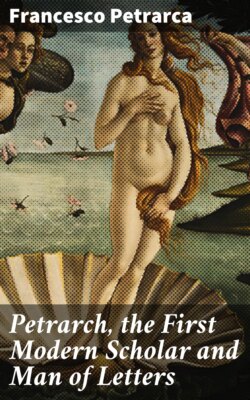Petrarch, the First Modern Scholar and Man of Letters

Реклама. ООО «ЛитРес», ИНН: 7719571260.
Оглавление
Франческо Петрарка. Petrarch, the First Modern Scholar and Man of Letters
Petrarch, the First Modern Scholar and Man of Letters
Table of Contents
INTRODUCTORY
I. BIOGRAPHICAL
Francesco Petrarca to Posterity
Petrarch's Preface to his First Collection of Letters
II. PETRARCH AND HIS LITERARY CONTEMPORARIES
Petrarch's Passion for Work—The Trials of a Man of Letters
The Visit to the Goldsmith at Bergamo
Petrarch Disclaims all Jealousy of Dante
The Story of Griselda
On the Italian Language and Literature
His Aversion to Logicians
III. THE FATHER OF HUMANISM
To Marcus Tullius Cicero[1]
The Old Grammarian of Vicenza,
On the Nature of Poetry
On the Scarcity of Copyists
Ignorance and Presumption Rebuked
The Young Humanist of Ravenna
IV. TRAVELS
An Excursion to Paris, the Netherlands, and the Rhine
The Ascent of Mount Ventoux
The Charms of Pavia
V. POLITICAL OPINIONS. RIENZO AND CHARLES IV
VI. THE CONFLICT OF MONASTIC AND SECULAR IDEALS
VII. PETRARCH'S CONFESSIONS
VIII. FINALE
Petrarch's Intention to Work until the Last
Отрывок из книги
Francesco Petrarca
A Selection from His Correspondence with Boccaccio and Other Friends, Designed to Illustrate the Beginnings of the Renaissance
.....
He chose Venice as the most appropriate place to establish his library. The letter in which he offers to leave his books to that city gives us a clear notion of his purpose. Laying aside all regard for classical models, he addressed the Venetian Government in the current Latin of the chancery:
"Francesco Petrarca desires, if it shall please Christ and St. Mark, to bequeath to that blessed Evangelist the books he now possesses or may acquire in the future, on condition that the books shall not be sold or in any way scattered, but shall be kept in perpetuity in some appointed place, safe from fire and rain, in honour of the said saint and as a memorial of the giver, as well as for the encouragement and convenience of the scholars and gentlemen of the said city who may delight in such things. He does not wish this because his books are very numerous or very valuable, but is impelled by the hope that hereafter that glorious city may, from time to time, add other works at the public expense, and that private individuals, nobles, or other citizens who love their country, or perhaps even strangers, may follow his example and leave a part of their books, by their last will, to the said church. Thus it may easily fall out that the collection shall one day become a great and famous library, equal to those of the ancients. The glory which this would shed upon this State can be understood by learned and ignorant alike. Should this be brought about, with the aid of God and of the famous patron of your city, the said Francesco would be greatly rejoiced, and glorify God that he had been permitted to be, in a way, the source of this great benefit. He may write at greater length if the affair proceeds. That it may be quite clear that he does not mean to confine himself in so important a matter to mere words, he desires to accomplish what he promises, etc.
.....